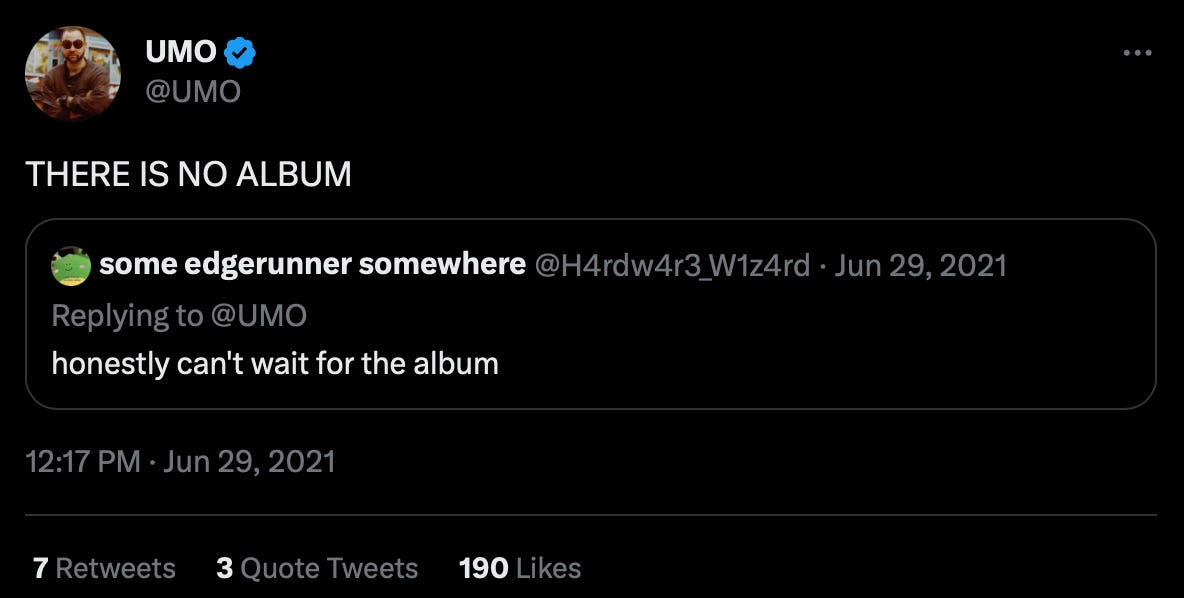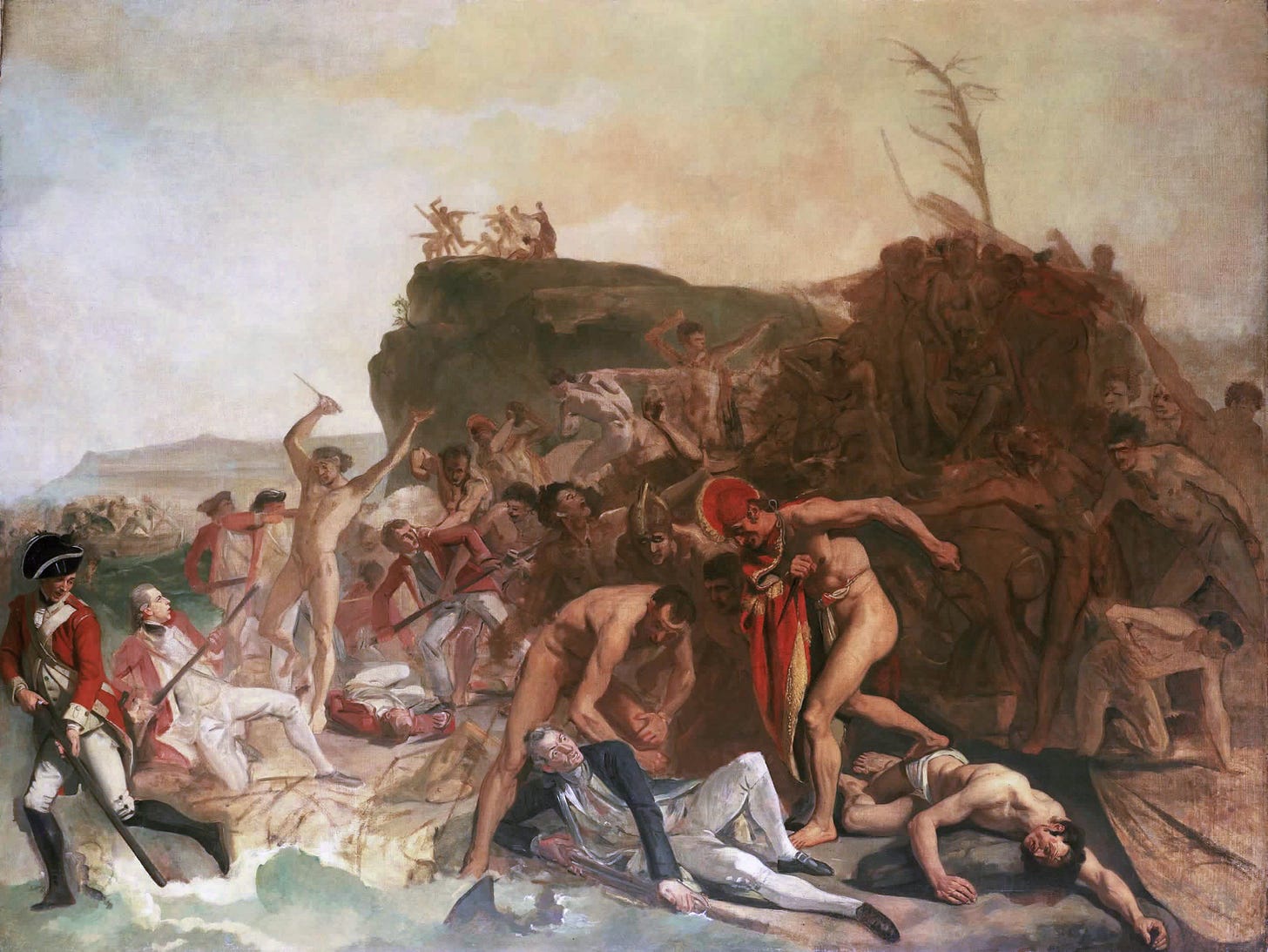It Isn't Complicated
On Unknown Mortal Orchestra's 'V'
These days you place higher priority on the easy things, the things in your life that you have access to and that you enjoy: a decent bottle of Sancerre, Sunday mornings in bed with the fianceé, watching the dog run wild at the park, somersaulting across the grass, tanning her ten teats under intermittent San Francisco sun. This process is known as aging.
Those in control of the discourse machine—thirty year-olds like you—have been going through this phase at a time of crisis. Not long ago, the world and all its boring horrors stopped suddenly, only for us to collectively decide (by plurality, if not majority) that things were mostly actually alright the way they were, and that we ought to do everything in our power to turn the clock back to the edenic era of 2019. Of course, we couldn’t cram everything back into Pandora’s box after the pandemic burst it open, and so the prevailing story of the last several years has been a hard and halting one, one of old and new realities blending as best they can.
In the minds of many, these two phenomena have become one, and choices that every person from every generation has made or will make have taken on extraordinary significance. A subset of professionals going remote means the death of the center city. A drought of decent films signals the end of the movie theater. Influencers on TikTok will put legacy media conglomerates out of business. Big Things Are Happening.
It goes without saying that personal choices are shaped by the forces of history. Sometimes they signify something greater in the culture, manifesting as a symptom of unseen economic realities. Other times, a choice is just that: a choice. People move, relationships end, priorities change, whether or not there’s a generational pandemic ongoing. You want to do something, so you do it. It doesn’t need to be more complicated than that.
Ruban Nielson’s excellent new album as Unknown Mortal Orchestra, V, was made for just such a reason. The hour-long double LP is stacked with heavy jams, heady muzak, and exquisitely literate guitar work, sounds that appeal to vastly different audiences. There isn’t a surefire streaming hit, no “Hunnybee” or “Can’t Keep Checking My Phone;” the two closest things have already been out in the world for 18 months. This isn’t a record designed to soundtrack sedan commercials or catapult UMO to the top line of festival posters. This is an exercise in hanging out, a trip without any particular destination in mind.
Songs roll into and out of one another, start and stop cues tagged at arbitrary moments in the collage. V is best listened to with phone planted firmly in pocket, no mind whatsoever paid to where in the tracklist you happen to be at any given moment. Take the opening trio, a fifteen-minute tour through many of the moods conjured this time around. “The Garden” brings you along slowly, ramping up from atmospheric organ to squeaky-clean riffs and machine gun snares, then shifts seamlessly into “Guilty Pleasures,” a classic slice of mid-tempo Unknown Mortal Orchestracana—sequenced this early, perhaps, in order to assure you that this is still the same band behind “Ffunny Ffriends” and “So Good At Being In Trouble.” And then you hit “Meshuggah,” an elastic, aquatic take on the post-stardom Weeknd formula, complete with sampled handclaps. Suddenly, Beyoncé co-writing credits seem like a distinct possibility.
A ten-track LP made up of songs in such a sonic palette would surely be more palatable to the market, but that doesn’t seem to have factored into the decision making here. How else to explain tunes like “The Widow” or “Shin Ramyun,” lengthy instrumentals that have more in common with UMO’s yearly SB releases than anything that’s appeared on a proper record up to this point? This is where the album lives and breathes, in the spaces in between. They open the sound up and knit it together, turn V into a real LP rather than a collection of songs to be subdivided and resequenced by Spotify employees.
“Weekend Run,” the catchiest thing here, dropped all the way back in June 2021—before Donda, before Omicron, before Zelensky. Ruban devoted much of his Twitter feed around that time to RTing excited fans clamoring for an album, informing them that there was no album, that the one track was all to expect. You didn’t believe it at the time—who drops a killer single after three years away without a full record to promote?—but as the days turned, it became clear he wasn’t bullshitting. He just wanted to put out a banger new track. So he did.
Ruban’s never shied away from socially-observant songwriting (see: “Extreme Wealth and Casual Cruelty,” “Stage or Screen,” “American Guilt;” the man has a knack for titles), but he’s generally avoided a focus on the personal. Even “Multi-Love,” a song explicitly about his time in a polyamorous relationship, kept listeners at a distance. Interviewers hammered away at the subject the whole press cycle and hardly made a dent. What there was to say was said on the record. If there’d been more to add, the song would’ve been longer.
All of which is to say the conclusion of V comes as a surprise, with its focus on Ruban’s Hawaiian heritage. “Keaukaha,” another smooth instrumental, seems to draw its name from an indigenous Hawaiian homesteader community established in the early 20th century, in response to the death and displacement wrought by American business interests. The sound is subdued, the mood pensive. You aren’t just hanging out anymore.
The follow up is somewhat more explicit. “I Killed Captain Cook” celebrates the death of Captain James Cook, an early shock troop of the Anglosphere’s settler colonialist agenda. Cook, who “discovered” the Hawaiian Islands and named them in honor of this fucking guy, met his timely end after instigating a conflict with native Hawaiians and attempting to kidnap Kalaniʻōpuʻu, the ruling chief of the big island. Kalaimanokahoʻowaha, the chief who killed Cook, is the narrator of the song:
Along the shores of the pathway to the gods
I sent him along on his way
Bringer of death and disgrace
To the ancestral place
The track is spartan, deliberately dressed down, just an acoustic guitar and a few verses worth of vocals. You know the Hawaiians are doomed—you know how this story ends, with American supermarkets stocked full of plantation pineapple—but Kalaimanokahoʻowaha’s heroism is something worth celebrating, a rare W in a centuries-long losing streak for colonized peoples.
Why choose this moment, this record, to highlight his ~*identity*~? Maybe it’s a sign of something bigger, an oncoming wave of IdPol indie rock about to swamp the culture.
Then again, maybe not. Maybe Ruban’s aging, making different choices, doing what feels good, what comes naturally. So are you. V is the right record for right now. It stretches out, invites you in, lets you take your time. You listen to it because you want to. It doesn’t need to be more complicated than that.





